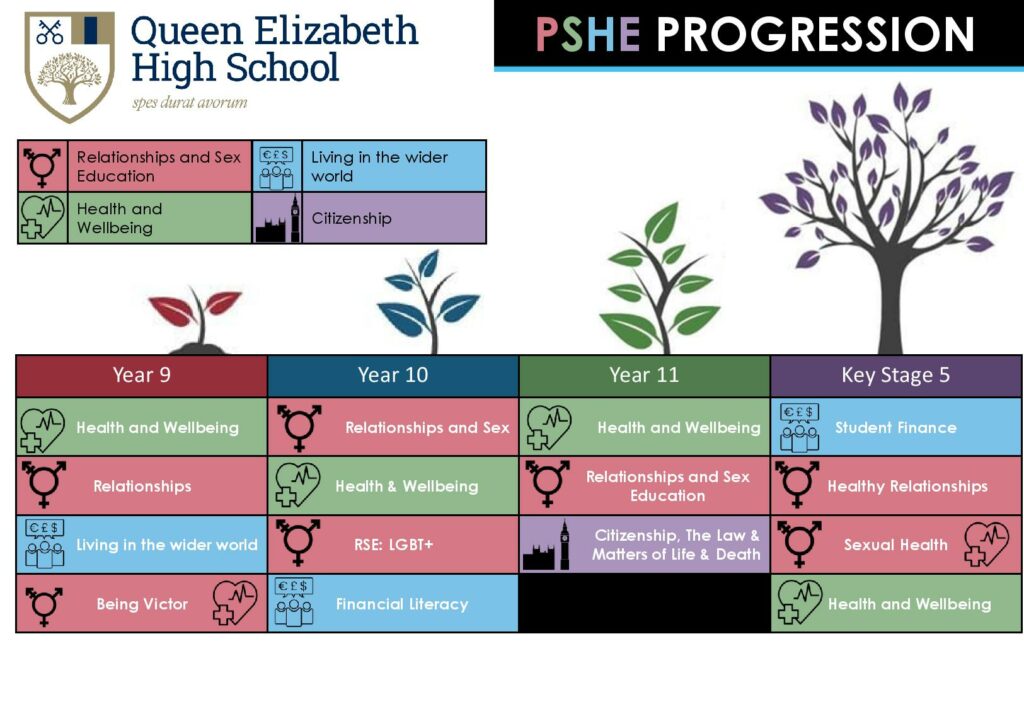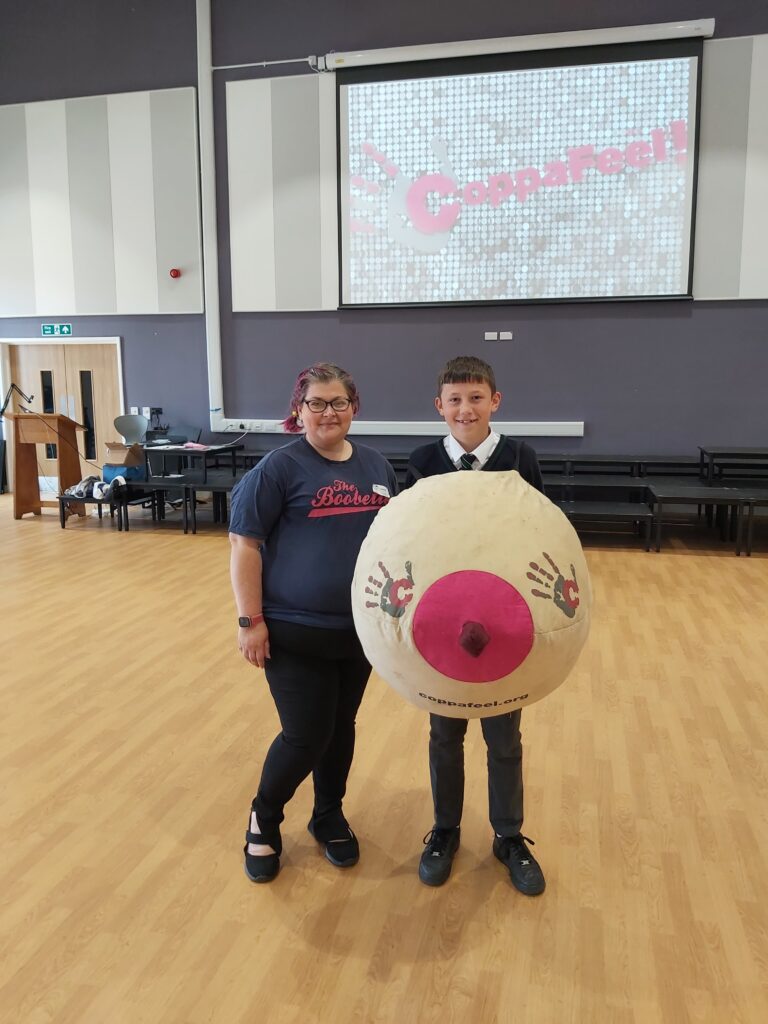PSHE
“PSHE education helps children and young people to stay safe, healthy and prepared for life’s challenges and opportunities.” (PSHE Association website)
Our PSHE programme ensures we are fully compliant with the Statutory guidance on relationships education, relationships and sex education (RSE) and health education (DfE 2019)

Relationships
Students have the opportunity to learn:
- strategies to manage strong emotions and feelings
- the characteristics and benefits of positive, strong, supportive, equal relationships
- parenting skills and qualities and their central importance to family life (including the implications of young parenthood)
- to recognise when a relationship is unhealthy or abusive (including the unacceptability of both emotional and physical abuse or violence including rape) and strategies to manage this or get help
- managing changes in personal relationships including the ending of relationships
- to develop an awareness of exploitation, bullying and harassment in relationships (including the unique challenges posed by online bullying and the unacceptability of physical, emotional, sexual abuse in all types of teenage relationships, including in group settings such as gangs) and how to respond
- about the concept of consent in relevant, age-appropriate contexts building on Key Stage 3
- about impact of domestic abuse (including sources of help and support)
- the impact of separation, divorce and bereavement on families and the need to adapt to changing circumstances
- about statutory and voluntary organisations that support relationships experiencing difficulties or in crisis, such as relationship breakdown, separation, divorce, or bereavement

- how to access such organisations and other sources of information, advice and support
- about diversity in sexual attraction and developing sexuality, including sources of support and reassurance and how to access them
- how to negotiate the agreement, or withholding of consent, to engage in different degrees of sexual activity
- how to ascertain and respect others’ right to agree or withhold consent to engage in different degrees of sexual activity
- to recognise the impact of drugs and alcohol on choices and sexual behaviour
- to manage unwanted attention in a variety of contexts (including harassment and stalking)
- to understand and respect others’ faith and cultural expectations concerning relationships and sexual activity
- to assess readiness for sex
- about accessing and the correct use of contraception, negotiating condom use, reinforcing and building on learning in Key Stage 3
- to understand the consequences of unintended pregnancy and of teenage parenthood (in the context of learning about parenting skills and qualities and their importance to family life)
- the reasons why parents choose to adopt or to place children for adoption
- about abortion, including the current legal position and the range of beliefs, opinions and myths about it
- the pathways available in the event of unintended pregnancy, the possible physical and emotional reactions and responses people may have to each option and who to talk to for accurate, impartial advice and support
- that fertility decreases with age
- to understand the role of sex in the media and its impact on sexuality (including pornography and related sexual ethics such as consent, negotiation, boundaries, respect, gender norms, sexual ‘norms’, trust, communication, pleasure, orgasms, rights, empowerment, sexism, feminism)
- the role peers can play in supporting one another (including helping vulnerable friends to access reliable, accurate and appropriate support)
Health & Wellbeing
Students have the opportunity to learn:
- to evaluate the extent to which their self-confidence and self-esteem are affected by the judgments of others
- to make effective use of constructive feedback and differentiating between helpful feedback and unhelpful criticism
- the characteristics of emotional and mental health and the causes, symptoms and treatments of some mental and emotional health disorders (including stress, anxiety and depression)
- strategies for managing mental health including stress, anxiety, depression, self harm and suicide, and sources of help and support
- where and how to obtain health information, advice and support (including sexual health services)
- to take increased responsibility for monitoring their own health (including testicular and breast self-examination)
- how lifestyle choices affect a foetus
- about STIs, including HIV/AIDS, how to protect themselves and others from infection and how to respond if they feel they or others are at risk
- to recognize and manage feelings about, and influences on, their body image including the media’s portrayal of idealized and artificial body shapes
- about health risks and issues related to this, including cosmetic procedures
- how to recognise and follow health and safety procedures
- how to find sources of emergency help and how to give basic and emergency first aid in appropriate contexts
- about personal safety and protection, reducing risk and minimising harm in different settings (including social settings, the street, on roads and during travel)
- the short and long-term consequences of substance use and misuse for the health and mental and emotional wellbeing of individuals, families and communities, including the health risks related to second-hand smoke
- understand the terms ‘habit’, ‘dependence’ and ‘addiction’ in relation to substance use and to whom to talk if they have concerns
- the wider risks and consequences of legal and illegal substance use including on their personal safety, career, relationships and future lifestyle

Living in the Wider World
Students have the opportunity to learn:
- to evaluate their own personal strengths and areas for development and to use this to inform goal setting
- about the unacceptability of all forms of discrimination, and the need to challenge it in the wider community including the workplace
- to think critically about extremism and intolerance in whatever forms they take
- to recognise the shared responsibility to protect the community from violent extremism and how to respond to anything that causes anxiety or concern
- about harassment and how to manage this (including the workplace)
- how their strengths, interests, skills and qualities are changing and how these relate to future employability
- about the information, advice and guidance available to them and how to access it
- to further develop study and employability skills (including time management, self-organisation and presentation, project planning, team-working, networking and managing online presence)

- about the range of opportunities available to them for career progression, including in education, training and employment
- about changing patterns of employment (local, national, European and global)
- to take full advantage of any opportunities for work experience that are available
- about rights and responsibilities at work (including their roles as workers, and the roles and responsibilities of employers and unions)
- about attitudes and values in relation to work and enterprise (including terms such as ‘customer service’ and ‘protecting corporate or brand image’)
- about confidentiality in the workplace, when it should be kept and when it might need to be broken
- to develop their career identity, including how to maximise their chances when applying for education or employment opportunities
- to recognise and manage the influences on their financial decisions, (including managing risk, planning for expenditure, understanding debt and gambling in all its forms)
- to be a critical consumer of goods and services (including financial services) and recognise the wider impact of their purchasing choices
- their consumer rights and how to seek redress
